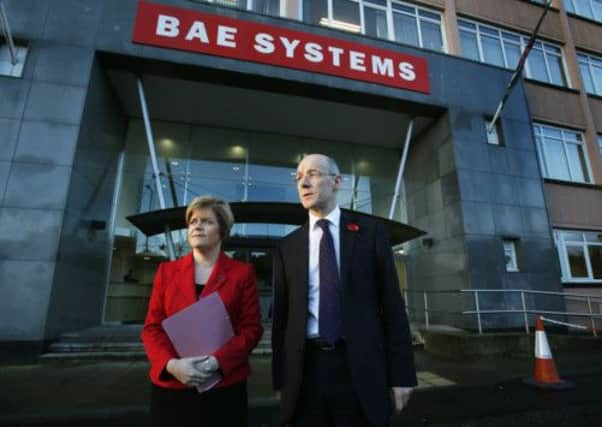Euan McColm: Sturgeon in a storm over warships


Standing in for Alex Salmond (who was on a trade mission to China) at First Minister’s Question Time, Sturgeon handled what should have been a difficult issue for the pro-independence campaign with great skill. While doing so, she spoke considerable rubbish. And, not only that, she almost got away with it.
Before we linger painfully over the arrant rot Sturgeon came out with in the Holyrood debating chamber, we should examine how she was able, initially, to ride out an issue that has now become a considerable problem for the Yes campaign.
Advertisement
Hide AdAdvertisement
Hide AdAfter weeks of speculation, it was announced on Wednesday that BAE was to end shipbuilding at its Portsmouth yard next year, with the loss of almost 1,000 jobs. This grave news for the south of England meant better (or less terrible) news for workers in Govan and Scotstoun on the banks of the River Clyde, where around 800 of 3,200 jobs will go. The end of Portsmouth’s capability to build ships leaves Scotland in line to win the next multi-billion pound contract to make 13 Type 26 Global Combat Ships. Nod and wink have been performed.
Inevitably, the ongoing debate over Scotland’s place in the UK came into play. Both Philip Hammond, the Defence Secretary, and Alistair Carmichael, the Liberal Democrat Secretary of State for Scotland, let it be known that the decision to award that contract would depend on Scotsvoting to reject independence in next September’s referendum.
To some English MPs, this was proof that the Westminster coalition was attempting to bribe Scots to vote No to the break-up of the UK. Scottish nationalists accused the British Government of blackmail and bullying. Despite this not being the case, the barb stuck, and gave the SNP some breathing-space.
And, boy, did the Scottish Government need that. It’s difficult to see how the issue of BAE Systems’ job losses could be positively influenced by Scottish independence. If anything, the compelling argument is that the remainder of the UK would withhold contracts in Scotland if the nationalists win the referendum.
Sturgeon’s political skills had gone some way to neutralising this problem by the time Question Time had finished on Thursday. The Deputy First Minister was at her most poised. She spoke very well indeed about the economic and emotional importance of shipbuilding. Sturgeon got the tone right.
Having done this, Sturgeon, under cover of an impressive parliamentary performance, made assertions that she had no way of knowing to be true.
She argued that what Hammond and Carmichael said was wrong. She insisted that if Scotland voted in favour of independence then the Type 26 ships would still be Clyde-built. Any claim to the contrary was just a rumour that was spread around town.
Sturgeon reminded the chamber of Hammond’s remarks that the decision to have the ships built in Scotland had been taken because the Clyde yards were considered the best equipped and staffed. If this was the case, Sturgeon wanted to know, then why would the UK Government suddenly decide to have them built elsewhere? For quite obvious reasons, I’d have thought.
Advertisement
Hide AdAdvertisement
Hide AdThere would be huge obstacles to Scotland winning the Type 26 contract in the event of a Yes vote. First and foremost is the UK Government’s policy that it only orders warships from UK yards. A post-Yes Scotland wouldn’t qualify to get the work under that condition. We can also easily imagine the howls from workers in Portsmouth (from across England, in fact) should work worth several billion pounds be given to an independent Scotland.
Sturgeon’s insistence that Scotland would still get the contracts defies both UK government policy and political logic. It also defies the position of trade unions at the Clyde yards who have made it clear this weekend that they don’t consider it at all certain they’d be building UK warships in an independent Scotland.
Sturgeon has a problem with those unions now. During a meeting to discuss with shop stewards how the Scottish Government might support the 800 Clyde workers facing redundancy, the Deputy First Minister was accused of using the remaining workforce as a political football.
John Dolan, the GMB’s convener at the Scotstoun yard, flatly contradicted Sturgeon’s assertion that British warships would continue to be built on the Clyde after a Yes vote. Dolan fatally undermined Sturgeon’s – and, therefore, the Scottish Government’s – position. Not only were there yards in England ready to take on MoD contracts, he said, but he had been told personally by the UK government the contract for the Type 26 frigates would not go to yards in an independent Scotland.
Sturgeon, he added, should stop using the workers. That will have hit the Deputy First Minister hard. She had it coming.
If we want to understand the scale of the political problem facing Sturgeon, we only have to remember her superb Holyrood performance on Thursday. When she spoke of the emotional importance of shipbuilding, she correctly identified Scots’ sentimental attachment to it. The shop stewards at the Clyde yards represent an industry that enjoys an unusual place in our affections, and their accusation that Sturgeon has been playing politics with the livelihoods of workers won’t easily be dismissed.
Sturgeon’s handling of this issue began so well. But today her argument is destroyed and her personal credibility damaged by that trade union attack. I wonder how she’ll get out of this one. I don’t see an obvious route. «
Twitter: @euanmccolm